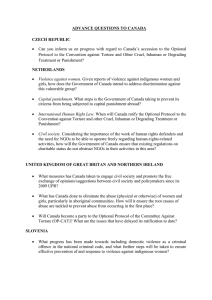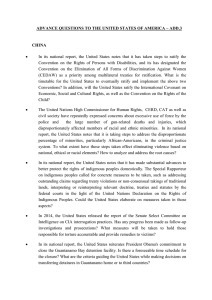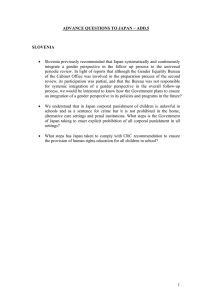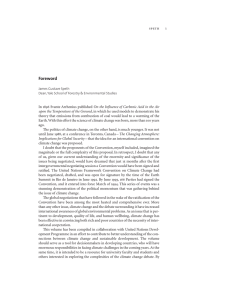A General Assembly Report of the Working Group on the Universal Periodic
advertisement
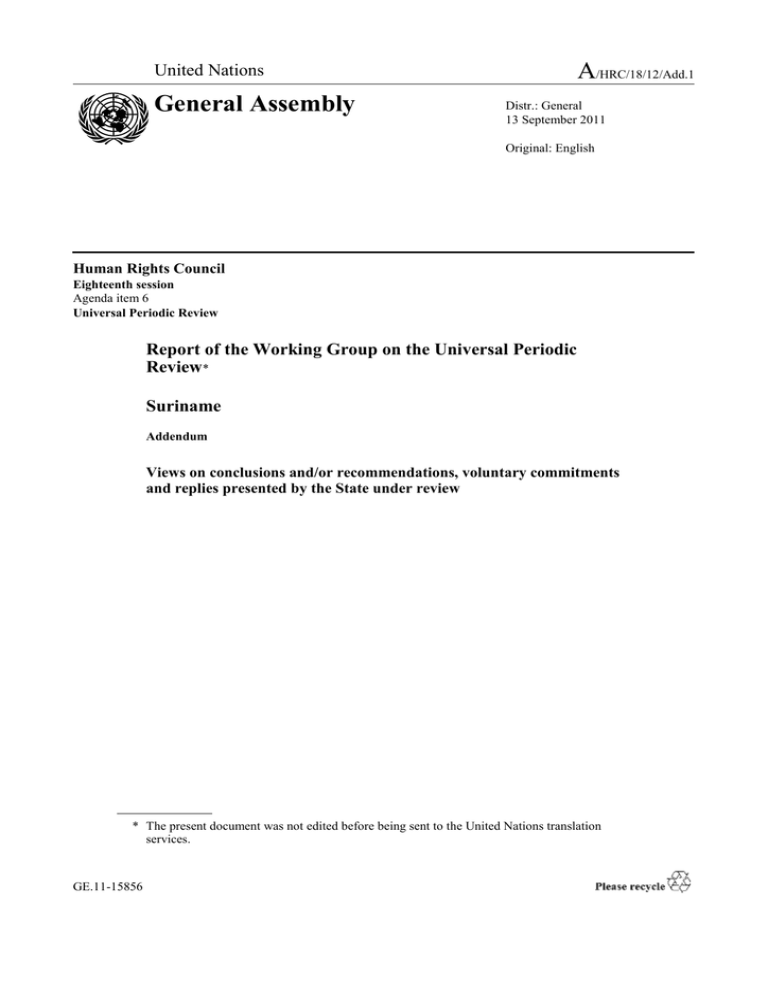
A/HRC/18/12/Add.1 United Nations General Assembly Distr.: General 13 September 2011 Original: English Human Rights Council Eighteenth session Agenda item 6 Universal Periodic Review Report of the Working Group on the Universal Periodic Review* Suriname Addendum Views on conclusions and/or recommendations, voluntary commitments and replies presented by the State under review * The present document was not edited before being sent to the United Nations translation services. GE.11-15856 A/HRC/18/12/Add.1 I. Introduction 1. On May 6, 2011, The Republic of Suriname presented its Report under the Universal Periodic Review during the 11th Session of the Working Group of the Human Rights Council. The State received 91 recommendations during the inter-active dialogue, some of which were accepted and others which were deferred, as they required further consideration on the national level. 2. The Government of Suriname hereby presents its formal response to all recommendations made during its Universal Periodic Review on May 6, 2011. This Addendum contains the following paragraphs: Paragraphs 1 and 2 contain an introduction. The recommendations which have been approved are contained in paragraphs 3and 4. Paragraphs 5 to 12 contain observations, and recommendations which can currently not be supported, are contained in chapter IV. The conclusion is stated in chapter V. II. The recommendations below enjoy the support of Suriname 3. The following recommendations formulated during the interactive dialogue and listed below enjoy the support of Suriname: 72.1, 72.2, 72.3, 72.4, 72.5, 72.6, 72.7, 72.8, 72.9, 72.10, 72.11, 72.12, 72.13, 72.14, 72.15, 72.16, 72.17, 72.18, 72.19, 72.20, 72.21, 72.22, 72.23, 72.24, 72.25, 72.26, 72.27, 72.28, 72.29, 72.30, 72.31, 72.32, 72.33. 4. The following recommendations which were examined also enjoy the support of Suriname: 73.5 Conclude the ratification process of the Optional Protocol to the Convention on the Rights of Persons with Disabilities (Spain); 73.12 Review National Legislation, in particular the Nationality and Residence Act, the Penal Code and the Personnel Act so as to repeal provisions that could facilitate discrimination (Mexico); 73.13 Establish a National Human Rights Institution (Maldives); 73.14 Establish a National Human Rights Institution in accordance to the Paris Principles (Indonesia/Spain); 73.15 Establish a National Human Rights institution to protect and Promote Human Rights in accordance with the existing international standards (Algeria); 73.20 Promote effectively equality between men and women (France); 73.21 Address gender disparity proactively (Indonesia); 73.22 Repeal all discriminatory provisions against women in domestic legislation, fully incorporating the Convention on the Elimination of All Forms of Discrimination against Women into the national legal framework (Slovakia); 73.23 Develop further and implement policies and legislation aimed at gender equality, particularly with regard to acquisition of nationality and to sexual or domestic violence (Brazil); 73.24 Provide all the necessary measures to improve the participation of women in public life and in the political and economic spheres (Algeria); 2 A/HRC/18/12/Add.1 73.25 Promote initiatives aimed at ensuring that there are equal conditions of employment for women (Mexico); 73.26 Introduce gender as an issue in the school curriculum in order to combat stereotypes and cultural factors to inequality (Norway); 73.27 Address awareness campaigns at both men and women, to project positive images of women and of the equal status and responsibilities of men and women in the private and public spheres (Hungary); 73.28 Increase its effort to attain equality of rights between men and women, including through awareness raising activities to combat patriarchal cultural practices and gender stereotypes that undermine the exercise of such rights (Argentina); 73.29 Continue to conduct awareness-raising campaigns promoting equal conditions and equal responsibilities between women and men both in the private and public sphere with the aim of abolishing the persistence of patriarchal and stereotypical attitudes and achieving greater representation of women in the decision-making and managerial positions (Spain); 73.30 Adopt and implement efficient measures to eliminate discrimination on any grounds and against all vulnerable groups, with particular care on indigenous population (Slovakia); 73.31 Establish the legal conditions that are necessary in order to avoid discrimination of Maroons and Indigenous Peoples in terms of socio-economic development, health status, and access to healthcare (Germany); 73.32 Repeal the death penalty (Canada); 73.33 Abolish definitively death penalty (France); 73.34 Abolish the death penalty and sign and ratify the second Optional Protocol to the International Covenant on Civil and Political Rights (Spain); 73.35 Accede to the Second Optional Protocol to the International Covenant on Civil and Political Rights and abolish definitively death penalty (Belgium); 73.36 Approve pending amendments to the Penal Law to abolish the death penalty (Netherlands); 73.37 Formalize its longstanding non-use of capital punishment by abolishing all legal provisions for capital punishment (United Kingdom and Great Britain and Northern Ireland); 73.38 Implement institutional reforms to abolish current provisions on the death penalty (Ecuador); 73.39 Implement the recommendations of the Human Rights Committee, by prosecuting and sentencing as appropriate the perpetrators of the extra-judiciary executions of December 1982 and the Moiwana Massacre in 1986 (France); 73.40 Take steps to improve the treatment of women prisoners by, inter alia, circulating the United Nations Rules for the Treatment of Women Prisoners and Non-custodial Measures for Women Offenders (the Bangkok Rules) and to seek assistance from the Office of the United Nations High Commissioner for Human Rights and United Nations Office on Drugs and Crime in implementing them (Thailand); 3 A/HRC/18/12/Add.1 73.41 Adopt swiftly the necessary legislation and develop a comprehensive antitrafficking strategy and plan of action to combat trafficking of children and women, especially for the purpose of sexual exploitation (Hungary); 73.42 Provide enhanced training to law enforcement, immigration, and judicial officials regarding trafficking cases and victims, and provide foreign victims of trafficking with legal alternatives to deportation (United States of America); 73.43 Take steps to ensure that the National Commission for the Eradication of Child Labour can effectively carry out its mandate (Australia); 73.47 Prioritize the creation of school facilities in remote areas and implement a functioning system of data collection on children living in districts bordering neighboring countries (Norway); 73.48 Adopt the revised Penal Code – in keeping with the recommendation of the Convention on the Rights of the Child – which raises the age of criminal responsibility (Trinidad and Tobago); 73.51 Develop concrete measures to enhance and monitor the level of access and quality of healthcare services for women (Trinidad and Tobago); III. Observations 5. The State endeavors to carry out the recommendations which it supports within the shortest possible term; in fact a number of them have been in progress for some time already. Although the State deems legislation to be essential, society’s acceptance and observance of the regulations is of the highest importance, since the law should be a reflection of society’s need and desire for regulation of the issues it is faced with, and must as such be supported by the entire nation. 6. A number of recommendations require broad social debate and a thorough study Implementation will require the formulation of adequate national policy. Simply approving these recommendations is neither possible nor realistic; therefore the State is - for the time being - unable to accept the recommendations categorized under paragraph 4. Nevertheless, the Government of the Republic of Suriname appreciates all recommendations made in reference to this report. Recommendations which cannot be supported, concern the following issues: 7. Ratification of conventions and protocols (recommendations 73.1-73.11) For the time being, the State has decided against acceding to certain protocols and conventions due to reasons contained in paragraphs 3.1 and 3.2. For example, Suriname has not ratified the Convention on the Protection of the Rights of All Migrant Workers and Members of Their Families, since it is opposed in principle to the fact that rights could be derived thereof by aliens without legal residence. However, not being a state party to human rights treaty does not in any way indicate that the State is not willing to promote and protect the human rights in question. 8. Extend standing invitations to the UN special procedures (recommendations 73.1673.19) The State has considered the ways in which it may receive special rapporteurs, in order to guarantee specific human rights. The Government will gladly accept the offered expertise, as it did with the recent on-site visit of the UN Special rapporteur for the land rights of indigenous people. However, Suriname reserves the right to explore other options as well, for example by utilizing the expertise of other institutions, as demonstrated by the recent on-site visit of the OAS special rapporteur for persons deprived of their liberty in the 4 A/HRC/18/12/Add.1 America’s, by national debate and the issuance of statements. It might not be opportune for a visit of a UN special rapporteur to coincide with either of the above. 9. Corporal punishment of children (recommendations 73.44-73.46) With regard to corporal punishment, there is no legislation for the public domain; however, at the start of each school year, the Ministry of Education and Community Development extends specific instructions to schools regarding the prohibition of corporal punishment at school. Regulation is also in place with regard to youth in prison. The social debate as well as the process of implementing regulation for day care centers is on-going. As to the private domain (corporal punishment at home and in the family), the Act on Domestic Violence has initiated the process of combating violence, among which corporal punishment of children. 10. Discrimination of LBGT (recommendations 73.49-73.50) Debate with religious authorities and other groups regarding the extension of special rights to LBGT individuals, is necessary. National legislation offers protection of human rights to all Surinamese citizens, as well as all others on Surinamese territory; hence LBGT individuals enjoy the same protections as all others. Even though sexual orientation remains a sensitive and controversial issue, the Government will endeavor to undertake those steps necessary to address all concerns. 11. Indigenous Rights and land Rights Issues (recommendations 73.52-73.58) Prior to the upcoming National land Rights conference, there has been discussion with stake-holders, NGO’s and civil society, as well as with the UN special rapporteur on land rights. The consultation regarding land rights is aimed at preparing both the Government as well as indigenous and maroon organizations for effective participation in the upcoming National land Rights Conference. This national debate will officially commence a broad national effort for a just and balanced solution to the issue of land rights. 12. Enjoyment of all human rights by Migrants (recommendation 73.58) The constitution guarantees the human rights of all persons on Surinamese territory. However, under certain circumstances those rights may be restricted, for example when it comes to illegal aliens. These have recently been called to register, in order to eliminate their illegal status (see paragraph 7). IV. The recommendations which cannot be supported 13. These are the recommendations which cannot be supported: 73.1 Consider the progressive ratification of the main international human rights treaties that are still pending, which may require technical assistance (Chile); 73.2 Ratify outstanding core international human rights instruments and abolish the death penalty1 (Slovenia); 73.3 Ratify the United Nations Convention against Torture and Other Cruel, inhuman or Degrading Treatment or Punishment (United Kingdom of Great Britain and Northern Ireland); 1 With regard to recommendation 73.2 the latter part, concerning abolishment of the death penalty, is accepted. 5 A/HRC/18/12/Add.1 73.4 Consider ratifying the Convention against Torture and Other Cruel, Inhuman or Degrading Treatment or Punishment and its Optional Protocol, and the Convention on the Rights of Persons with Disabilities 2 (Brazil); 73.6 Consider ratifying those main international instruments to which it is not party, particularly the convention against Torture and Other Cruel, Inhuman or Degrading Treatment and Punishment and its Optional Protocol, The International Convention on the Protection of the Rights of All Migrant Workers and Members of Their Families, The Optional Protocols to the International Covenants on Civil and Political Rights and Economic, Social and Cultural Rights and to the Convention on the Elimination of All Forms of Discrimination against Women (Ecuador); 73.7 Study the possibility of ratifying the Convention against Torture and Other Cruel, Inhuman or Degrading Treatment or Punishment; the International Convention for the Protection of All Person from Enforced Disappearance; the International Convention on the Protection of the Rights of All Migrant Workers and Members of Their Families; and the Second Optional Protocol to the International Covenant on Civil and Political Rights (Argentina); 73.8 Complete its international commitments to protect and promote human rights by acceding to the relevant international instruments, in particular to the Convention against Torture and Other Cruel, Inhuman or Degrading Treatment or Punishment and the Optional Protocol to the Convention on the Elimination of All Forms of Discrimination against Women (France); 73.9 Ratify the 1954 Convention relating to the Status of Stateless Persons and the 1961 Convention on the Reduction of Statelessness (Slovakia); 73.10 Ratify the International Labour Organization Convention No. 169 concerning Indigenous and Tribal Peoples in Independent Countries (Norway); 73.11 Ratify the International Labour Organization Convention No. 169 concerning Indigenous and Tribal Peoples in Independent Countries in order to ensure greater protection, as it is merited, by the special situation of indigenous and tribal population of the country, and consequently in this line, comply with the decision of the Inter-American Court of Human Rights regarding their collective titles to property (Ecuador); 73.16 Extend an open and standing invitation to the special procedures (Ecuador/Spain); 73.17 Extend a standing invitation to the United Nations human rights special procedures (Maldives); 73.18 Issue a standing invitation to the United Nations special procedures mandate holders (Slovenia); 73.19 Consider extending an open and standing invitation to the special procedures of the United Nations, which may contribute to interactive cooperation with the system (Chile); 73.44 Prohibit explicitly corporal punishment at school at home, as well as in any public establishment attended by children (France); 2 6 With regard to recommendation 73.4 the latter part, concerning the Convention on the Rights of Persons with Disabilities, is accepted. A/HRC/18/12/Add.1 73.45 Adopt the necessary legal measures to prohibit all forms of violence against children, including corporal punishment in all settings, particularly in the family, schools, alternative childcare and places of detention for juveniles (Mexico); 73.46 Follow-up efficiently on the recommendation of the Committee Rights of the Child to explicitly prohibit by law all forms of violence children, including corporal punishment, in all settings, including in the schools, alternative childcare and places of detention for juveniles, subsequently implement those laws effectively (Slovenia); on the against family, and to 73.49 Equalize the age of consent for opposite and same sex conduct, and adopt appropriate legislative measures and other measures to prohibit discrimination on the basis of sexual orientation and gender identity (Norway); 73.50 Equalize the age of consent for opposite and same sex conduct, and adopt legislative and other measures to explicitly prohibit discrimination on the basis of sexual orientation and gender identity (Netherlands); 73.52 Continue efforts to recognize and uphold the collective rights of the indigenous people (Trinidad and Tobago); 73.53 Recognize the collective rights of indigenous people to their lands and resources, giving the matter priority when the issue of land rights is raised in Parliament as indicated in the government’s statement last October (Canada); 73.54 Acknowledge legally the rights of indigenous and tribal peoples to own, develop, control and use their lands, resources and communal territories according to customary law and traditional land-tenure system (Hungary); 73.55 Take the necessary steps to act in compliance with the verdict rendered in 2007 by the Inter-American Court of Human Rights in the “Saramaka People Case” and to respect Indigenous People and Maroons right to land (Norway); 73.56 Ensure that indigenous communities, as far as possible, benefit fully from the provision of public services and that their land rights are legally recognized, including via implementation of the 2008 3 decision of the Inter-American Court of Human Rights (United Kingdom); 73.57 Execute fully the judgment of the Inter-American Court of Human Rights regarding logging and mining concessions in the territory of the Saramaccan people and enshrine land rights of Indigenous and Maroon groups in the Surinamese legal framework ( Netherlands); 73.58 Ensure the enjoyment of all human rights by migrants, and further strengthen efforts aiming at their regularization (Brazil). V. Conclusion 14. Although a number of recommendations are not accepted at this time, the State is aware of the fact that they represent challenges to an ideal Human Rights climate in Suriname. Therefore they will enjoy the continued attention of the Government of the Republic of Suriname. 3 Judgment rendered in 2007. 7
